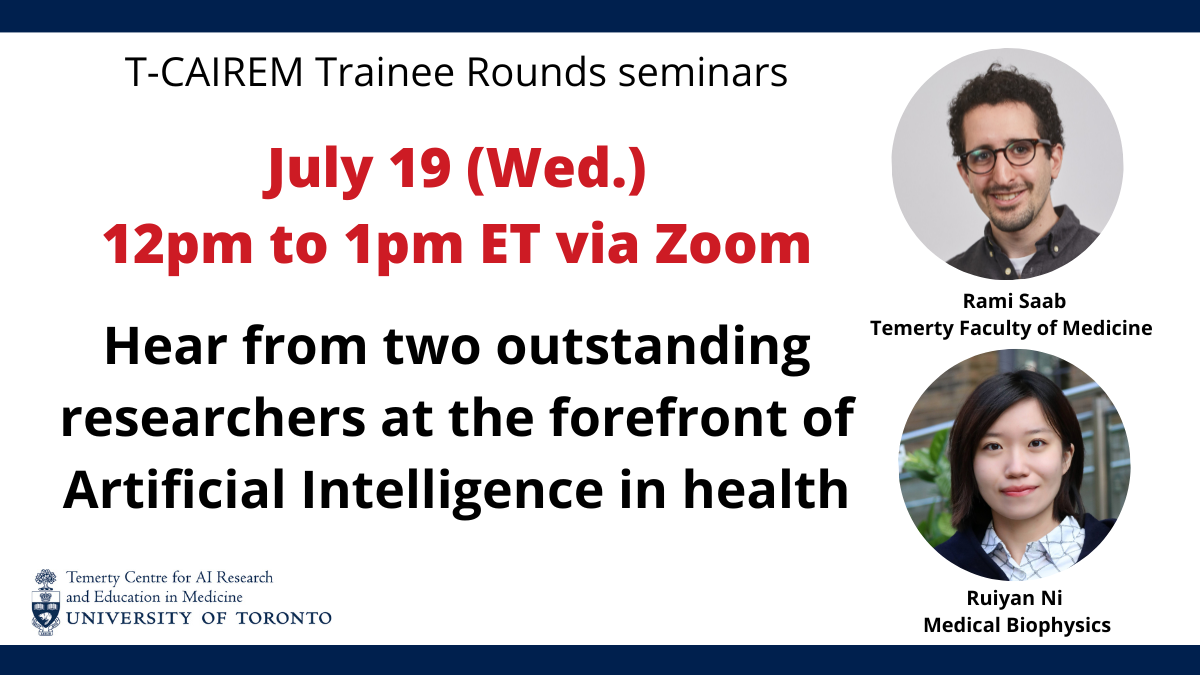Main Second Level Navigation
Trainee Rounds: Rami Saab and Ruiyan Ni
DATE: July 19, 2023 (Wed.)
TIME: 12pm to 1pm ET
METHOD: Zoom
PRESENTERS: Rami Saab and Ruiyan Ni
Rami Saab
Temerty Faculty of Medicine University of Toronto
PROJECT
Machine learning assisted swallowing assessment (MASA) - using AI to detect swallowing abnormalities in post-stroke patients
ABSTRACT
Swallowing dysfunction (dysphagia) is one of the most common, serious effects of stroke and is associated with a significantly increased risk of mortality. Early swallowing assessment in the acute care setting is thus crucial. Existing tools to assess swallowing often involve time-consuming, manual screening tools requiring trained personnel and subjective vocal quality ratings. In this study, we apply convolutional neural networks to classify human voice recordings of post-stroke patients transformed into Mel-spectrograms. We hypothesize that the speech changes present in these vocal samples can be used to discriminate between patients who passed or failed existing dysphagia screening tools.
BIOGRAPHY
Rami holds a Bachelor of Engineering (B. Eng) from McMaster University in Biomedical Engineering and a MASc from the University of Toronto. His past research experiences include EEG based brain-computer interfaces, surgical robotics, and most recently, using vocal features as a marker of neurological conditions. He has also worked in industry in health tech. Rami is now a medical student in the Temerty Faculty of Medicine at the University of Toronto where he hopes to continue working on bridging the fields of technology and health.
MORE INFORMATION
Ruiyan Ni
PhD Candidate, Department of Medical Biophysics, University of Toronto
PROJECT
Automatic Segmentation for Targets and Organs at Risk (OARs) in Cervical High Dose Rate (HDR) Brachytherapy via Deep Learning
ABSTRACT
Cervical cancer can be effectively treated with Brachytherapy (BT) boost, enhancing survival rates over SBRT/IMRT boost. The time-consuming aspect of BT is the delineation of organs at risk (OARs) and tumor targets, a process that deep learning (DL) approaches can automate. Current DL algorithms often lack robustness, leading to their failure in clinical use. To overcome this, our study uses large, diverse datasets to develop a novel DL framework for auto-segmentation of OARs and targets. We also introduce a novel loss function, emphasizing accurate segmentation near the tumor, to increase the model's clinical relevance.
BIOGRAPHY
Ruiyan holds a Bachelor of Biomedical Engineering from the Hong Kong Polytechnic University, and she's now a second-year PhD student at Department of Medical Biophysics, University of Toronto. She has worked on deep learning and medical image analysis, and her PhD work focuses on the auto-contouring of normal organs and tumor targets for gynecological patients undergoing brachytherapy. Ruiyan is passionate about using AI techniques to automate and improve diagnosis, treatment planning, and patient care in oncology, with the ultimate goal of improving patient outcomes in radiation therapy.
MORE INFORMATION

